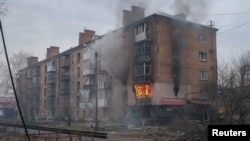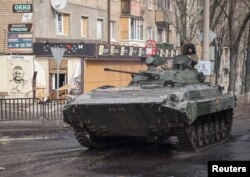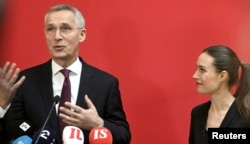Ukrainian officials described fighting Tuesday around the eastern city of Bakhmut as intense, although little territory has changed hands between Moscow’s and Kyiv’s forces.
"The most difficult situation is still Bakhmut and the battles that are important for the defense of the city," Ukrainian President Volodymyr Zelenskyy said in his nightly address Tuesday. "Russia does not count people at all, sending them to constantly storm our positions. The intensity of fighting is only increasing."
Zelenskyy said the Ukrainian commander in charge of defending Bakhmut, Colonel General Oleksandr Syrskyi, reported 800 Russian troops have been killed in the area since Thursday.
Earlier Tuesday, Syrskyi said on social media, “Despite taking significant losses, the enemy has dispatched its best-trained Wagner assault units to try to break through the defenses of our troops and surround the city."
He was referring to the Wagner Group, the Russian paramilitary unit fighting alongside Russian troops.
Russia has been intensifying its attacks on several areas in eastern Ukraine, including Bakhmut, the ruined city where 75,000 people once lived.
Fighting for months has focused on towns and villages around Bakhmut, with Moscow attempting to surround the city to cut off Ukrainian supply routes, although some fighting has occurred within the city itself.
After failing a year ago to quickly take Kyiv, the Ukrainian capital, in the earliest days of the war, Russia has concentrated its fight in the eastern Donbas region. Both sides have sustained heavy casualties in the warfare.
The Center for Strategic and International Studies, a Washington-based research organization, said in a new report Tuesday that 60,000 to 70,000 Russian troops have been killed in the last year, more combat deaths than Moscow sustained in all the conflicts it has fought since World War II combined, including in Chechnya and Afghanistan.
NATO expansion
NATO Secretary General Jens Stoltenberg said Tuesday that progress is being made toward ratifying the bids of Finland and Sweden to join the alliance and that both countries have lived up to agreements they made to address concerns raised by Turkey.
Only Turkey and Hungary have yet to give their final approval for the accessions of Finland and Sweden in a process that must be unanimous among NATO's current members.
"I'm absolutely confident that both Finland and Sweden will become members of NATO," Stoltenberg told reporters as he appeared alongside Finland's Prime Minister Sanna Marin in Helsinki. "The time is now to ratify both in Budapest and in Ankara."
Turkey has expressed objections to Sweden, accusing the government of being too lenient toward groups that Ankara considers terror organizations.
Turkish Foreign Minister Mevlut Cavusoglu said Monday that Sweden has not lived up to its side of a June agreement in which Sweden and Finland pledged to lift restrictions on selling weapons to Turkey and to intensify work on Ankara's requests to extradite suspected Kurdish militants.
Turkey, Sweden and Finland are due to resume talks about their NATO bids on March 9 after Turkey halted the process in response to far-right protesters burning a Quran outside the Turkish Embassy in Stockholm.
Marin said Tuesday the potential threat of Russia following its invasion of Ukraine last year prompted Finland to seek NATO membership, saying the NATO line "is the only line Russia wouldn't cross."
She said that while Finland and Sweden made the decision to apply for their own interests, it is also in the interest of NATO, because the expansion would strengthen the defense of northern Europe.
Some information in this report came from The Associated Press, Agence France-Presse and Reuters.









